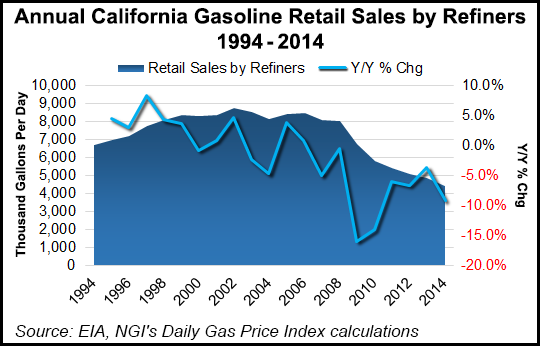Regulatory | NGI All News Access
California Lawmakers Pass Revised Climate Change Law
California lawmakers on Friday passed a watered-down climate bill (SB 350) and an oil pipeline safety measure (SB 414) directly related to the Plains All American Pipeline rupture in Santa Barbara in May (see Shale Daily, June 30).

After opposition from the oil and gas industry, state lawmakers and Gov. Jerry Brown gave up on two measures that were designed to support Brown’s climate change response (see Daily GPI, April 30). As a result, a provision for cutting by half the use of petroleum products in transportation by 2030 was stripped out of SB 350, and SB 32’s call to reduce greenhouse gas emissions 40% below 1990 levels by 2030 was held over for consideration next year.
Climate change and clean energy advocates, along with the governor and legislative leaders, were critical of the oil/gas industry and vowed to pursue again next year the goal of slashing use of petroleum products for transportation by half by 2030 in California.
Sen. Kevin de Leon called climate change “an unprecedented threat” to the state’s economy and environment that citizens have said they want an aggressive response to from political leaders. But the oil industry put up “a million-dollar smoke screen” requiring the petroleum section of SB 350 to be dropped, he said. The amended bill, however, would still allow the state to “make strides expanding access to clean energy” and increasing energy efficiency in buildings.
“Taking carbon out of the modern economy requires heroic efforts and tireless struggle,” Brown said. “SB 350, in both efficiency and renewable energy, ratchets up the California commitment. We have the technological means and now we have the legal mandate to reduce carbon pollution.”
The “Clean Energy and Pollution Reduction Act” codifies Brown’s goals to double energy efficiency in buildings and generate half of the state’s electricity from renewable sources by 2030, de Leon said.
“These new steps build on California’s historic commitment to lead the world in the fight against climate change and build a healthy and livable planet for our children and grandchildren, but our efforts to reduce carbon emissions are far from over as global warming and air pollution remain [two] of the most important issues of our generation and one the greatest threats for generations to come.”
Lawmakers passed new, stricter inspections for oil pipelines (SB 414), requiring the state Fire Marshall’s Office to annually inspect all oil pipelines under its jurisdiction. The legislators argued that if Plains All American had been required to submit to more frequent inspections, the spill that hit a series of beaches west of Santa Barbara and spread far along the coastline could have been avoided.
Industry representatives continued to oppose SB 350. While representatives of some energy utilities told NGI they supported SB 350, representatives for the Western States Petroleum Association and California Independent Petroleum Association said their positions had not changed.
© 2024 Natural Gas Intelligence. All rights reserved.
ISSN © 1532-1231 | ISSN © 2577-9877 |
